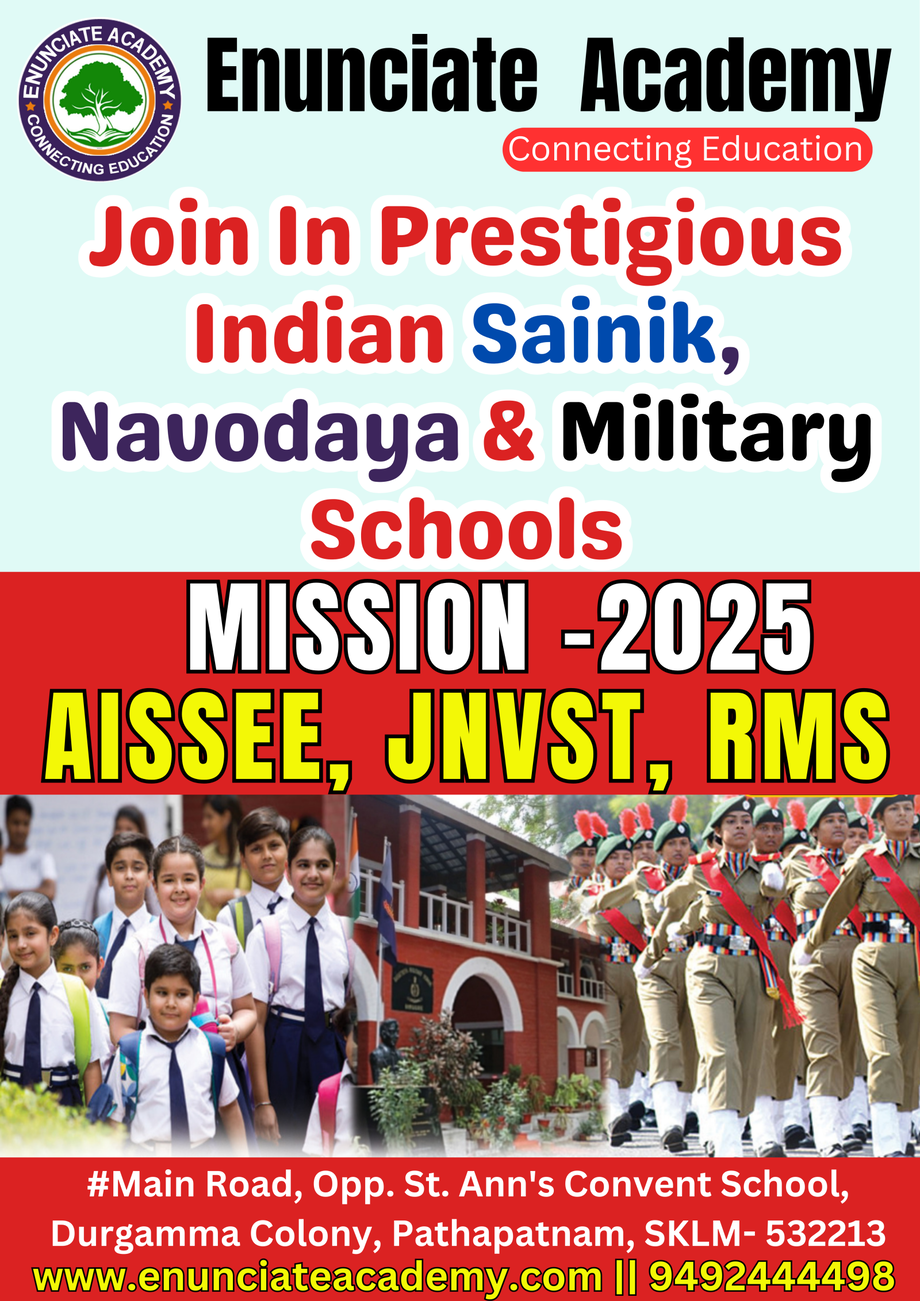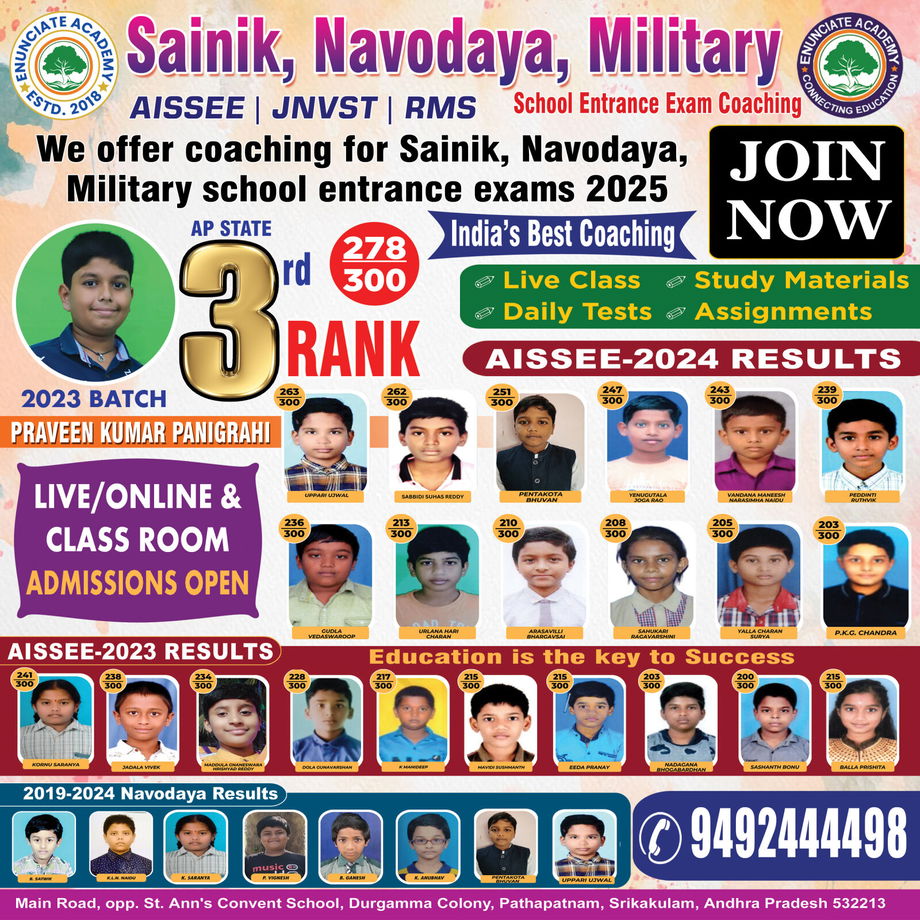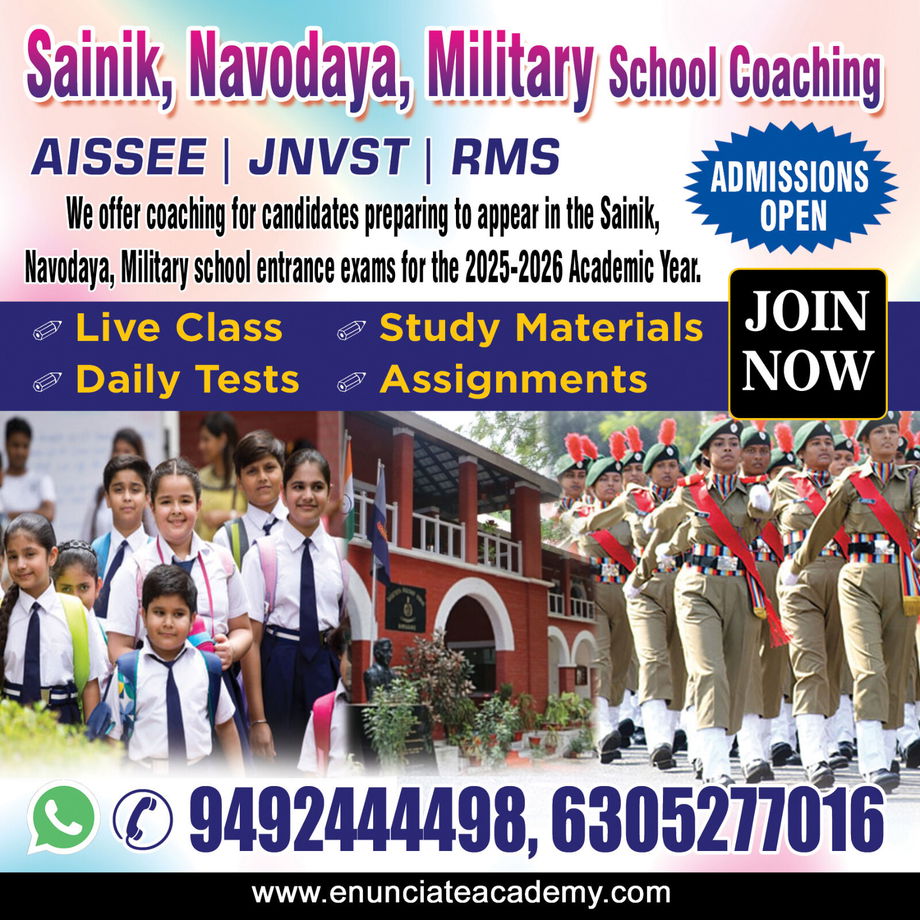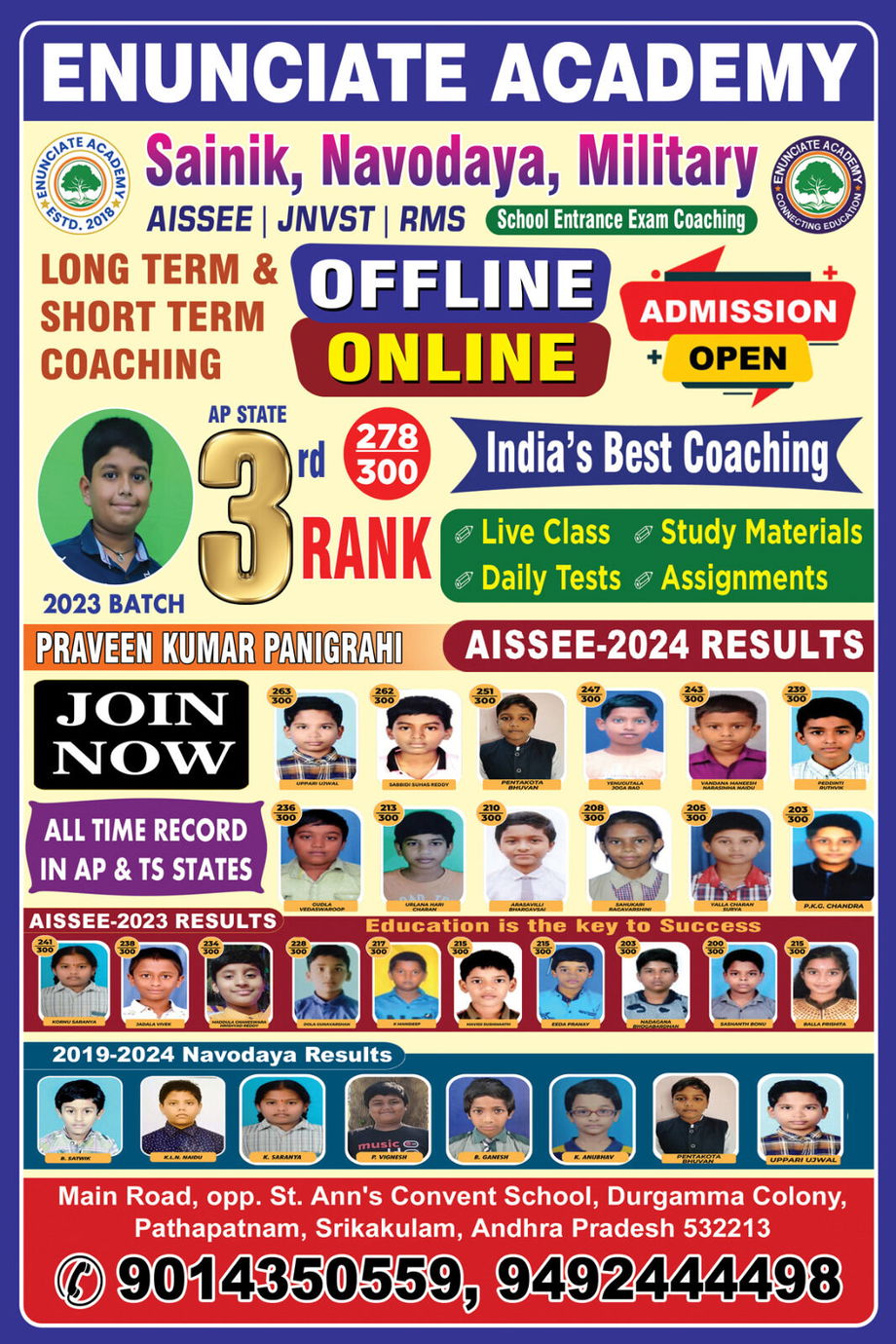The first of these schools, RIMC (Rashtriya Indian Military College), was established in 1922 in Dehradun, India, and was originally known as the Prince of Wales Royal Indian Military College. It was renamed to its current name in 1954 and has since produced numerous distinguished alumni who have served in various capacities in the Indian Armed Forces and other sectors

RMS schools are fully residential, CBSE-affiliated public schools that function under the aegis of the Ministry of Defence. They offer education to boys from Class VI to Class XII and have a strong emphasis on discipline, character development, and leadership skills
The admission process for RMS schools involves a Common Entrance Test (CET) for Class VI and Class IX, followed by an interview and medical examination. Admission to Class XI is based on Class X board exam results, and there is no written exam for this class
Candidates must be:
- Aged between 13-15 years as on 31 March 2024
- Born between 01 April 2009 to 31 March 2011
- Not less than 10 years and more than 12 years of age as on 31 March of the year of admission for Class VI
The application fee is Rs. 600

Is Sainik school better than RMS?
RMS is controlled directly by the Military. Sainik Schools are controlled by a board of governors under the chairmanship of the Defence Minister. Sainik Schools also have a quota for civilian wards.
RMS is ranked number 6 in India, number 2 in Karnataka, and number 1 in Belgaum. Sainik Schools have a great reputation in India. They provide all-round development of personality, including academics, physical, mental, and spiritual well being
What is the difference between Sainik School and Rashtriya Military School?
-
AdmissionSainik Schools admit about 100 students per year. RMS admit students for classes 6 and 9.
-
LocationSainik Schools are located in almost every state in India. RMS are only five schools in India.
-
Admission processSainik Schools require candidates to register for the entrance exam, clear the entrance exam and interview, and undergo a medical examination. RMS admissions are conducted in two stages: the Common Entrance Test, followed by an interview and medical exam.
-
FundingSainik Schools are partially funded by the government, and parents have to bear most of the expenses.

Frequently Asked Questions for Rashtriya Military Schools-India:
Q: What is the interview round at Rashtriya Military Schools?
A: The interview round at Rashtriya Military Schools is a crucial part of the admission process. It provides an opportunity for the school authorities to assess a candidate's personality, communication skills, leadership potential, and overall suitability for a military education.Q: How can I prepare for the interview round at Rashtriya Military Schools?
A: To prepare for the interview, research the school and its values, develop self-awareness, practice common interview questions, demonstrate leadership and teamwork skills, improve communication skills, and stay updated on current affairs and general knowledge.Q: What is the duration of the RMS interview?
A: The RMS interview lasts approximately 20-30 minutes.Q: What is the purpose of the RMS interview?
A: The RMS interview is conducted by a panel of experts to assess the candidate's qualifications for admission, including their personality traits, leadership qualities, communication skills, and motivation for joining the Indian defense forces.Q: What is the weightage of the RMS interview for Class 6 and Class 9?
A: For Class 6, the RMS interview has a weightage of 20 marks, and for Class 9, it has a weightage of 50 marks.Q: What is the interview basic etiquette for RMS?
A: To make a good impression during an RMS interview, candidates should follow basic guidelines, such as dressing appropriately, grooming well, maintaining good eye contact, and practicing active listening.Q: What are some common interview questions at Rashtriya Military Schools?
A: Common interview questions at Rashtriya Military Schools may include questions about a candidate's background, academic performance, hobbies, interests, future goals, current events, general knowledge, and awareness of the defense forces.Q: How can I improve my communication skills for the RMS interview?
A: To improve communication skills for the RMS interview, candidates can practice speaking clearly, confidently, and articulately, work on maintaining good eye contact, body posture, and active listening, and practice expressing their thoughts and ideas concisely and effectively.Q: How can I stay updated on current affairs and general knowledge for the RMS interview?
A: Candidates can stay updated on current affairs and general knowledge for the RMS interview by reading newspapers, watching news channels, and following relevant websites and social media accounts.Q: What is the role of Sukhoi Academy in preparing for the RMS interview?
A: Sukhoi Academy provides guidance, resources, and training to help candidates prepare for the RMS interview, including self-assessment exercises, mock interviews, and communication skills training.Q: What are the eligibility criteria for admission to Rashtriya Military Schools?
A: The eligibility criteria for admission to Rashtriya Military Schools include age limits, educational qualifications, and physical fitness standards. Candidates must meet the specified criteria for the respective class they are applying for.Q: How can I apply for admission to Rashtriya Military Schools?
A: To apply for admission to Rashtriya Military Schools, candidates can visit the official website of the school or obtain the application form from the school's admission office. The application process typically involves filling out the form, submitting required documents, and paying the application fee.Q: What are the benefits of studying at Rashtriya Military Schools?
A: Studying at Rashtriya Military Schools offers numerous benefits, including a disciplined environment, holistic development, leadership training, physical fitness, exposure to military values, excellent academic facilities, and opportunities for a career in the defense forces.Q: Are there any scholarships available for students at Rashtriya Military Schools?
A: Rashtriya Military Schools may offer scholarships or financial assistance to deserving students based on merit, performance, and financial need. Candidates can inquire about scholarship opportunities during the admission process.Q: What extracurricular activities are available at Rashtriya Military Schools?
A: Rashtriya Military Schools offer a wide range of extracurricular activities such as sports, adventure activities, cultural events, leadership camps, NCC training, social service initiatives, and various clubs and societies to promote overall development and character building.Q: How is discipline maintained at Rashtriya Military Schools?
A: Discipline at Rashtriya Military Schools is maintained through a structured system of rules, regulations, routines, and codes of conduct. Students are expected to adhere to high standards of discipline, respect authority, follow orders, and uphold the values of the school.Q: What are the career opportunities after graduating from Rashtriya Military Schools?
A: Graduates from Rashtriya Military Schools have various career opportunities, including joining the Indian Armed Forces as officers, pursuing higher education in defense-related fields, entering civil services, opting for careers in security and defense industries, or pursuing other professional paths.Q: How does Rashtriya Military Schools contribute to national security?
A: Rashtriya Military Schools play a vital role in contributing to national security by grooming young individuals to become disciplined, patriotic, and capable leaders who can serve the country with honor, integrity, and dedication in various roles within the defense forces.
To crack the Class IV entrance exam of Rashtriya Military Schools in India, candidates need to follow a structured preparation plan and utilize effective strategies. Here are some key tips based on the information from the provided sources:
- Understand the Exam Pattern:
- The entrance exam for Class IV typically consists of subjects like English, Mathematics, General Science, and Social Studies.
- Candidates should familiarize themselves with the exam pattern, duration, and marking scheme to prepare effectively.
- Thoroughly Revise NCERT Books:
- Focus on revising the NCERT books prescribed for Class IV to build a strong foundation in the subjects covered in the exam.
- Understand the concepts well and practice solving questions from these books to enhance understanding.
- Solve Practice Papers:
- Practice solving previous years' question papers regularly to get a sense of the exam format and types of questions asked.
- This practice will help candidates improve their speed, accuracy, and familiarity with the exam pattern.
- Time Management:
- Work on improving time management skills as it is crucial during competitive exams.
- Practice solving questions within the allocated time to ensure efficient use of time during the actual exam.
- Take Mock Tests:
- Regularly take mock tests to assess your preparation level and identify areas that need improvement.
- Mock tests help simulate exam conditions and provide valuable insights into your readiness for the actual exam.
- Stay Calm and Focused:
- On the day of the exam, remain calm and focused to tackle the questions effectively.
- Avoid getting flustered by difficult questions and maintain a steady pace throughout the exam.
- Understand the Exam Pattern:


